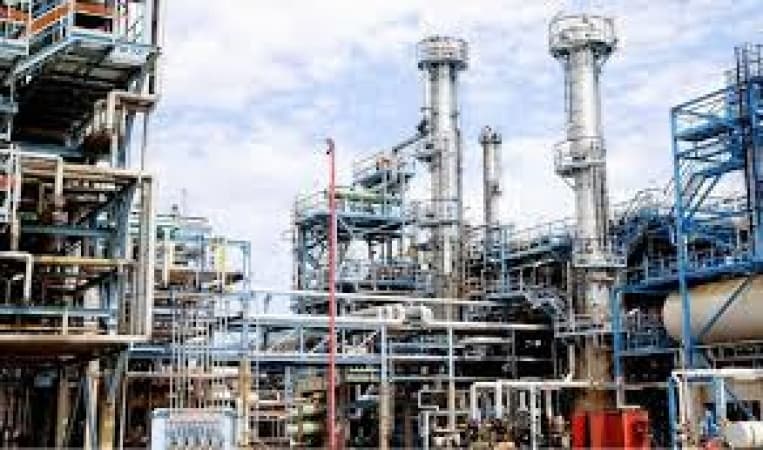

























Loading banners


NEWS EXPRESS is Nigeria’s leading online newspaper. Published by Africa’s international award-winning journalist, Mr. Isaac Umunna, NEWS EXPRESS is Nigeria’s first truly professional online daily newspaper. It is published from Lagos, Nigeria’s economic and media hub, and has a provision for occasional special print editions. Thanks to our vast network of sources and dedicated team of professional journalists and contributors spread across Nigeria and overseas, NEWS EXPRESS has become synonymous with newsbreaks and exclusive stories from around the world.

The shutdown Port Harcourt refinery
The shutting down of the Port Harcourt Refinery, the biggest refinery in the country has caused the Nigerian government over $249.7 million equivalent of N366.210 billion, in the period of five months, from May 24, 2025 to October 31, which is the period of 156 days, checks have revealed.
The refinery, located at Eleme axis of Rivers State, was revived on November, 2024 and commenced operations thereafter.
The Nigerian National Petroleum Company Limited (NNPCL) had stated that the revived plant has the production capacity of 60,000 barrels-per-day and was producing at least 1.4 million liters of Premium Motor Spirit (PMS) every day.
Also, the NNPC stated then that the refinery was producing straight-run gasoline (Naphtha) blended into 1.4 million litres of PMS daily; 900,000 litres of kerosene; 1.5 million litres of Automotive Gas Oil (Diesel); 2.1 million litres of Low Pour Fuel Oil (LPFO), and additional volumes of Liquefied Petroleum Gas (LPG), also known as cooking gas.
Daily Trust recalls that the Federal Government had approved $1.5 billion in 2021 for the comprehensive rehabilitation of the refinery, before the NNPCL under Mele Kyari?s leadership reopened the Old Port Harcourt Refinery on Tuesday, November 26, 2024.
The Refinery was shut down on May 24, 2025, for planned maintenance and a sustainability assessment, according to NNPCL, barely six months after a previous period of operational resumption following a $1.5 billion rehabilitation project.
With the landing cost of PMS standing at N900 per liter multiplied by 1,400,000, this amounts to N1,260,000,000 daily and N196,560,000,000 (N196.560bn) in 156 days.
Also, the price of Kerosene which is N1,005 per liter multiplied by 900,000 gives N904,500,000 and N141,102,000,000 in 156 days.
Similarly, the price of Diesel which is N1,220 per liter, totalling N1,220 multiplied by 1,500,000, making N1,830,000,000 and N285,480,000,000 in the 156 days analyzed by this Reporter.
The figures bring the total losses occasioned by the shutting down of the refinery to N366.210bn, equivalent of $249.7 million in five months and six days.
Why refinery was shut ? NNPCL
Recently, the Nigerian National Petroleum Company Limited (NNPCL) had disclosed that it was losing between N300 million and N500 million every month operating the Port Harcourt refinery before suspending rehabilitation works at the facility.
However, some staff in the refinery who spoke with Daily Trust on the condition of anonymity revealed that the amount could be the sum used in bringing in refined products from other refineries to Port Harcourt refinery in the name of production.
The staff who said they are barred by the management of the refinery from speaking with the press said the Port Harcourt refinery did not produce as claimed, as products were brought in from somewhere to sell out to marketers.
But the NNPC?s Group Chief Executive Officer, Bayo Ojulari, while addressing a delegation from the Petroleum and Natural Gas Senior Staff Association of Nigeria (PENGASSAN) led by its President Festus Osifo, few weeks ago, attributed the refinery?s poor performance to years of neglect and fundamental structural problems that made profitable operations impossible.
He said: ?When I resumed, one of the first priorities I focused on was the refineries, to have a quick review, to see whether we could quickly fix it.
?What I found is that we were losing between N300 million to N500 million monthly on the overall refinery. For Port Harcourt, we were sending in about 950,000 barrels as cargo, but less than 40 per cent was coming out.?
Refinery Staff Speak
Some staff of the Port Harcourt refinery told Daily Trust that right from November 2024 when the NNPC claimed that the refinery was working to May 2025 when it was shut down, there was never a time the refinery produced.
A staff member, who simply identified himself as Teska, not real name, said that at a point when the information began to filter out from within the refinery, the management had to issue a circular banning any staff from speaking or granting press interviews, adding that as of the time the refinery was shut down, neither the new or old plant was working.
Daily Trust observed that the refinery had 506 staff members as of July 2025, two months after it was shut down.
He said: ?They were bringing in refined products through Indorama petrochemical, they will go there and wash the fuel, and now load it through NNPC refinery, Port Harcourt, they were not refining here, to the extent that they warned the workers never to talk to the press, because at a point, the information was coming from the refinery, that the so called production is a scam, refinery workers were saying it and clearly explaining how those fuel that was sent through the refinery was being refined.
?But maybe after the maintenance, it will work this time, but I think NNPC should be sincere to Nigerians, if it doesn?t work, tell the truth, if you are able to make it work, say the truth, it?s for the collective good of Nigerians and our economy,? he said.
About five staff of the refinery who spoke with Daily Trust around the refinery host community said they were not aware if the production was going on between November 2024 to May 2025.
They added that they had seen marketers loading from the refinery, but how it was refined was not clear to them.
?You can go inside the refinery and make inquiries, they can direct you to those allowed to speak to press, but for me, I?m not aware if it was working from November 2024 to December 2025, I can?t say authoritatively, but tankers were loading from there,? one of the staff told Daily Trust.
Why Govt Refineries May Not Work ? NAPO
The National Association of Plants Operators (NAPO), whose members are also working in the refinery, told Daily Trust that the challenge of competition from those running private refineries in Nigeria and outside the country would not allow public refineries to work.
The National President of NAPO, Mr. Harold Benstowe, who spoke to Daily Trust on the shutting down of the Port Harcourt refinery, said if the refinery is given to good and capable companies in the country to manage, it will start to work properly.
He said: ?We have companies that can manage that refinery and you will see it will start working, but as I said, the monopoly in the production of fuel in Nigeria is one of the major factors working against the functioning of the refinery, those running private refineries may not like NNPC refinery to work, not to talk about the mainstream importers of fuel that are also fighting, because the moment the refinery starts to work, it will affect all their businesses, so, what is holding that refinery is monopoly, monopoly from the major oil magnates in the country, that are benefiting from the death of refinery.
?A lot of people are cashing out from the shutting down of the refinery, you can imagine where some of these politicians will go to other countries and build refineries, they will now carry our own crude to these refineries, to their private refineries, refine and bring it back to Nigeria, and sometimes you see them, they have big vessels in the sea where they brought the refined products and sell back to Nigerians,? he said.
Similarly, Oil marketers under the aegis of the Independent Petroleum Marketers Association of Nigeria (IPMAN) had in August asked the Group Chief Executive Officer (GCEO) of the Nigerian National Petroleum Company (NNPC) Limited, Bayo Ojulari, to either fix the Port Harcourt Refinery immediately or resign from his position.
The Eastern Zonal Secretary of IPMAN, Comrade Emmanuel Inimgba, in a statement following the continued shutdown of the refinery, expressed concerns over the delayed rehabilitation of the Port Harcourt Refinery, a project worth $1.5 billion, which he believes is being handled unprofessionally.
Inimgba noted that the refinery?s shutdown had resulted in thousands of job losses, affecting tanker drivers, NUPENG members, PETROAN staff, IPMAN workers, and host community members.
He stated that fixing the refinery would create jobs, boost the local economy, improve fuel supply and distribution, increase government revenue, enhance energy security, and improve living standards for host community members.
Inimgba revealed that credible sources indicate contractors have withdrawn from the site due to lack of funds, and the NNPC GCEO has not visited the refinery in four months.
He stated that IPMAN has expressed support for President Bola Ahmed Tinubu?s reform agenda.
He added: ?If the GCEO is unable to fix the Port Harcourt Refinery or demonstrate commitment to its rehabilitation, stakeholders and host communities will have no option but to call on President Tinubu to consider replacing him.?
Shutdown affects Nigeria?s foreign exchange, value chain ? Expert
Wumi Iledare, a Professor Emeritus of Petroleum Economics, who offered expert perspective on the implications of the Port Harcourt Refinery (PHR) shutdown in the past five months, explained that, Nigeria loses twice monthly through scarce foreign exchange spent on fuel imports and the loss in domestic value creation due to the refinery remaining idle.
The Petroleum Economic expert however, explained that a temporary shutdown may sometimes be necessary to prevent value destruction, because operating an inefficient refinery with low throughput, high energy intensity, or excessive losses can erode value faster than a well-managed maintenance shutdown.
He said: ?Each month the Port Harcourt Refinery remains idle, Nigeria loses twice, first through scarce foreign exchange spent on fuel imports, and again through lost domestic value creation. Beyond the financial cost, the shutdown undermines supply security, jobs, and the learning curve for local refining efficiency.
?However, a temporary shutdown may sometimes be necessary to prevent value destruction. Operating an inefficient refinery with low throughput, high energy intensity, or excessive losses can erode value faster than a well-managed maintenance shutdown. Efficiency and effectiveness in value creation must therefore guide operational decisions, not political pressure.
?To make public refineries work, government must depoliticize their management, enforce transparent crude supply agreements, adopt performance-based operations, and publish quarterly operational dashboards. Refineries fail not for lack of patriotism but for lack of commercial discipline, governance clarity, and measurable performance accountability,? Prof. Iledare stated. (Daily Trust)